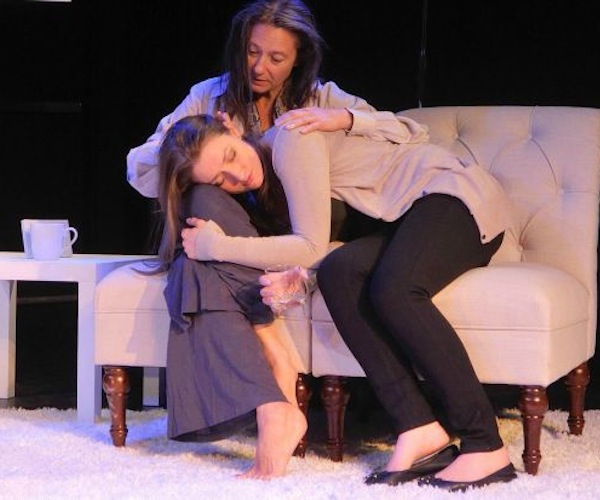Theater Review: “Lady Macbeth and Her Lover” — Three’s a Crowd
Lady Macbeth and Her Lover is a determinedly somber play that tries to attain the feel of classic tragedy.

Corrine (Maja Wampuszyc) and Hope (Jenny Ashman) in ‘Lady Macbeth and Her Lover.’ Photo Courtesy of the production.
Lady Macbeth and Her Lover by Richard Vetere. Directed by Sasha Brätt. Staged by Iron Spike Theatre at the New York International Fringe Festival at the 64E4 MainStage, 64 East 4th Street, New York, through August 30.
By Paul Dervis
The 19th annual New York International Fringe Festival (where did the time go?) is in full swing and it is safe to say Lady Macbeth and Her Lover is one of its hits. I tried to go to opening night, but they had sold out in advance. So I went Saturday and got the two last tickets on offer. Since then, the rest of the run has been booked.
I guess it’s one of the perks of staging a new play by a Pulitzer prize-nominated writer.
Richard Vetere, novelist, screenwriter, poet, and playwright, is a founding member of the Playwright’s Lab of the Actors Studio. His film Vigilante was recently named by BAM as one of the best Indie films of the ’80s. Vetere has worked with movie director Francis Ford Coppola, amongst many others. He has also had several plays produced in Greater Boston: Dogs and All the Way to Paradise quickly come to mind.
In this piece, Vetere writes about about three women, one strong, one weak, and all a bit crazy. Hope and Corrine are a pair of thirty year old poets. Neither seeks any form of happiness in their lives, fearing that contentment will kill their respective muses. They met a decade earlier, and over the years they have forged a rocky love affair. Hope is enough for Corrine, but the feeling is anything but mutual. Though Hope is married and has a daughter, she cannot escape her obsession for her hard-edged lover. She hates her life, partly because she has remained ‘undiscovered,’ and wants out desperately.
They form a suicide pact. Hope self-destructs, but Corrine chickens out, leaving her alone and broken.
Flash forward ten years. Corrine, now an internationally renowned writer, teaches at a leading university for which she has little respect. Into her life waltzes Emily, Hope’s little girl — now all grown up. Emily wishes to follow in her dear old mom’s creative footsteps and brings her verse to Corrine for guidance, perhaps also to use the older woman as a way to get a leg up on her peers at the school. Corrine is more than willing to oblige, but at a very heavy price.
You see, Emily is the spitting image of her mother and Corrine falls disturbingly in love with her. (A plot device that surely would make Woody Allen blush.) Corrine mentors the young girl, and she does well by Emily. Awards follow and a career takes off. But Corrine is cruel, demanding, and emotionally damaging.
Time passes, Emily grows. She wants more. Sure, she’ll be Corrine’s lover, but she desires a life separate from the older woman. She will still see her old mentor, but she will also get married and have a child of her own. History will repeat itself.
Corrine’s despair is harsh. Her desperation to not lose Hope/Emily again is sharp and bitter. And yes, it is clear that Corrine has never been able to separate her two lovers from each other; the mistakes of the past will haunt her future.
Lady Macbeth and Her Lover is a determinedly somber play that tries to attain the feel of classic tragedy. It is a difficult piece for the actors to master.
Jenny Ashman, who plays both Hope and Emily, has the chore of differentiating these two characters while suggesting that Corrine sees both as one and the same. To her credit, the actor creates subtle differences that help lead the viewer through the distinctive personal nightmares of mother and daughter.
Maja Wampuszyc is cast as Corrine, and the actor is admirably steadfast in sticking to the character’s heartless, self-centered persona. But, even though Corrine shows few signs of compassion, Wampuszyc tries to find some humanity in Vetere’s inhuman figure.
Iron Spike Theatre Company is from New Haven, CT; it is their first show. The production is well directed by the company’s Artistic Director Sasha Brätt. I look forward to seeing more of his work. As for Vetere, well, another one of his plays is receiving a reading and he is in pre-production for his next film. Name recognition has its privileges.
Paul Dervis has been teaching drama in Canada at Algonquin College as well as the theatre conservatory Ottawa School of Speech & Drama for the past 15 years. Previously he ran theatre companies in Boston, New York, and Montreal. He has directed over 150 stage productions, receiving two dozen awards for his work. Paul has also directed six films, the most recent being 2011’s The Righteous Tithe.
